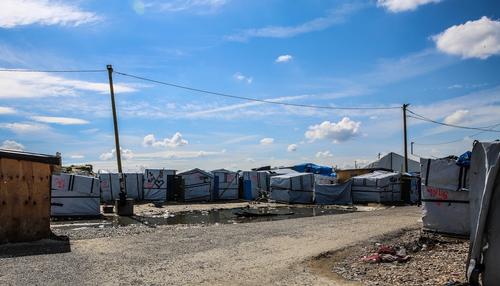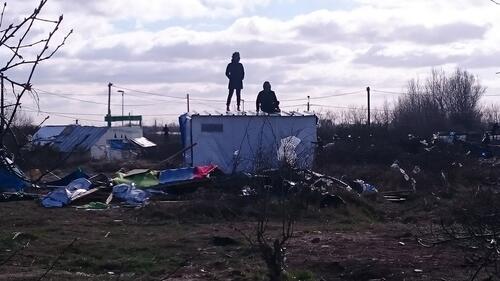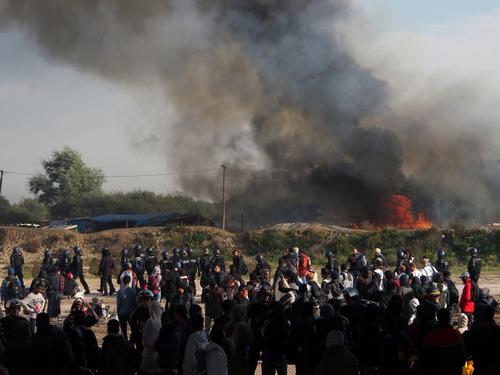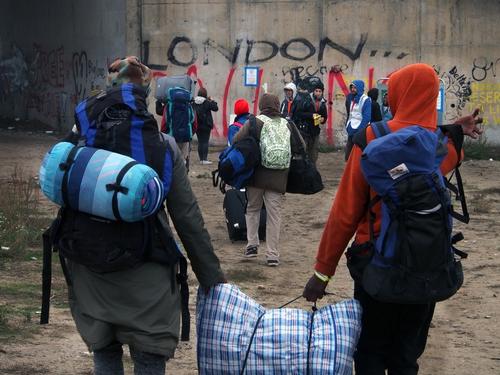When Zulfaqar arrived in Calais, hoping for a new life by his father’s side in Britain, he couldn’t have imagined the violence he would have to face in the 'Jungle', France’s most notorious refugee camp. The 20-year-old Iraqi has lived here for four months, witnessing frequent brawls among migrants, tear gas police raids, occasional racist slurs from locals, and overcrowding.
Like other refugees in Calais, Zulfaqar would never have imagined he would one day have to leave home never to look back – only to find shelter in a flimsy tent in often cold weather conditions.
“It was 5:00pm one evening in October 2015 when my father decided we should leave home and head somewhere safe. Islamic State fighters were killing everyone in their path, regardless of their religion or sect,” said Zulfaqar, who comes from a small village west of Mosul, in northern Iraq.
Within a few weeks, his father, a truck driver, had managed to find a smuggling route to Britain. He made the trip alone, knowing it would be easier to navigate smuggling routes and illegal border crossings by himself. The plan was to secure family reunion for his wife, his four daughters and Zulfaqar.
But as it turned out, Zulfaqar would not be able to wait for his father to kickstart the bid to secure visas for the family.
“One morning, I was supposed to meet my friend Ali, but he was running very late. I rang him, and a man with a deep voice answered. ‘This is Islamic State,’ the man told me. Ali was dead. My mother and I knew I had to get out of the country immediately – that it was not safe for me, a young man, to stay behind a minute longer,” he said.“I am young; I don’t want to die,” he said.
His eyes light up. “My passion is football – I used to play all the time. Many times, I would run with the ball, imagining I am Ronaldo or Messi, dreaming of the sound of fans cheering for me.”
“I left home with big dreams and hopes to find happiness and safety. That’s what made me flee in the first place. I went to Turkey and then took a boat to Greece. I travelled all the way to France and made it to Calais. From here, I need to find a way to get to the UK.”
Violence and overcrowding
Since French authorities demolished the southern half of the 'Jungle' camp in March this year, living conditions in the northern half have become very cramped. People are fighting for space: local NGOs have counted 1,000 new arrivals in the past month alone, including 142 minors. There are now 700 minors living in the 'Jungle'.
“Police brutality has made everyone’s lives here much harder than they already are,” Zulfaqar said.
On June 20, two to three hundred migrants rushed to the motorway leading to the Eurotunnel hoping they would be able to climb into trucks heading to Britain.
Zulfaqar was not among the people attempting to cross the Channel that day.
“I was afraid,” he said. “I rushed to my tent and zipped up the door. But even there, it was hard to breathe from all the tear gas the police had fired all over the camp – not just on the motorway.”
Bashir, a 17-year-old Syrian who fled his city of Daraa after an air strike destroyed his family home, has also had his share of violent experiences in France.
“One day, I was walking around in the city of Calais when a lady threw a bag full of rubbish at me,” he recalls. “To be honest, I don’t know why she did that – whether it has anything to do with the situation in the 'Jungle', or whether she was simply racist.”
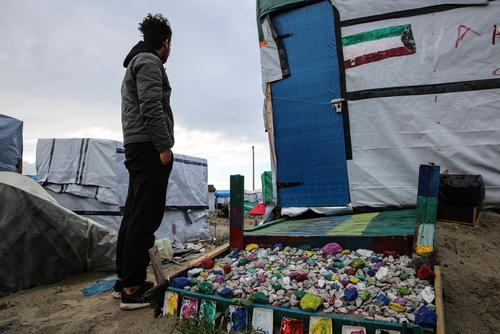
Fights between migrants
Space has become such a rare commodity in the 'Jungle' that some migrants have tried to uproot latrines installed by NGOs to set up camp in their place.
There is also a growing problem of rats in the 'Jungle', despite attempts at pest control.
And worst of all, says Zulfaqar, are the fights among migrants.
“Late last month, there was a big fight between the Sudanese and the Afghans,” he said, referring to two of the biggest groups of migrants in the 'Jungle'. “It started over something stupid between just two men, but each of them called in reinforcements. It became a clash between people from the two countries. They burnt down each other’s tents. More than 1,000 people were made homeless that day.”
The containers that the local authorities want migrants to move into are meanwhile full – with 350 people on the waiting list.
“I arrived in Calais four months ago after suffering violence in Iraq. But violence turned out to be the biggest problem here too,” Zulfaqar said. “I just want to join my father in the UK. I hope people can live in peace meanwhile in the 'Jungle', where a man is ready to beat another just for a toothbrush, a mobile phone or a place to sleep.”




